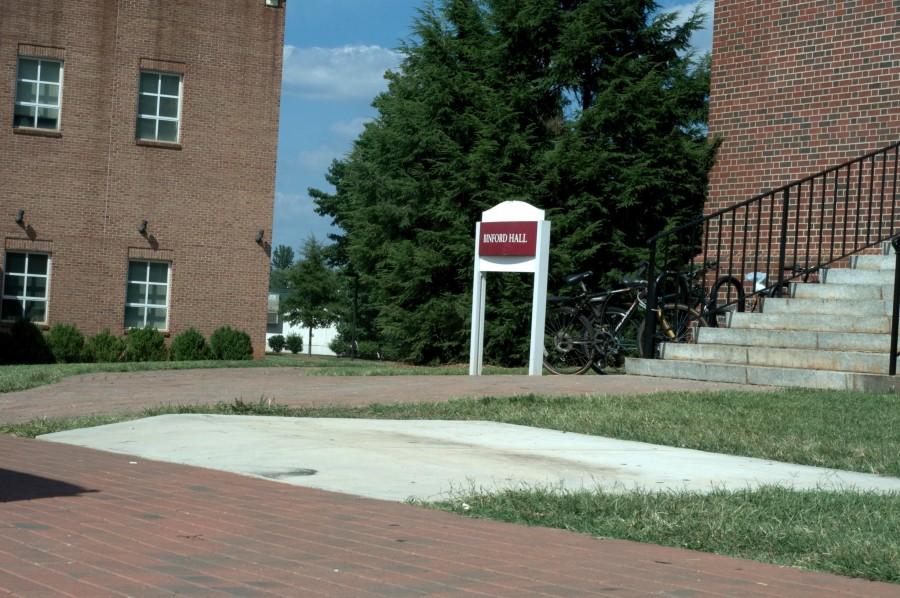Campus was a whole world away this summer, but now you are back and there were some developments over the summer that you probably missed.
HEAT bus subscription ends
In May, the contracts for student transportation with the HEAT and GTA buses expired.
“The main reason was $80,000,” said Aaron Fetrow, vice president for student affairs and dean of students.
Two-thirds of the operating costs for the HEAT contract were covered by a federal grant. The remaining costs were divided among the colleges on the circuit, according to enrollment.
The federal grant ended, leaving Guilford College footing an $80,000 bill when the total ridership only drew around $2,000. The college tried to keep paying, but the ridership numbers were too low to maintain the costs.
“At that cost, it was cheaper to buy bus passes,” said Kent Chabotar, president and professor of political science.
“The other reason was, quite frankly, we had a lot of student feedback that the HEAT bus was not very effective timing-wise,” said Fetrow. “Paying that much for a service that was questionable was a real difficult thing to do.”
There are solutions for those who actually needed the HEAT bus, such as bus passes.
“They are $50 a month,” Fetrow said. “So let us say we have 20 people who need a bus pass to actually get here for class. That is $1,000 a month, times 10 months is 10 grand. We are still far ahead of the $80,000.”
Students in need of a bus pass paid for by the college may contact Fetrow at the Office for Campus Life.
Guilford College named “Best Buy”
Over the years, Guilford has received accolades, such as its place in the book Colleges That Change Lives. Over the summer, it gained a few more. Guilford has recently been named a “Best Buy” in the pages of the 2012 edition of The Fiske Guide to Colleges.
“It is not just about price,” said Chabotar. “It is about outcomes, too. You are comparing what you get for what you pay.”
Alongside this, Forbes Magazine rated Guilford number 239 out of the 650 colleges profiled in their “America’s Top Colleges” list and sixth out of the 19 North Carolina colleges.
First community meeting focuses on student success
The first community meeting of the year met just before students returned to campus on Aug. 16. Community meetings bring together faculty, staff, and administrators to discuss various aspects of running the college. This year’s kick-off meeting focused on student outcomes.
Part of the meeting was spent on faculty sharing stories of particularly successful students, such as that of a music major who began his Guilford career resistant to undergraduate studies only to become an excellent student and accomplished musician.
The theme of student outcomes was chosen to highlight the goal of the second Strategic Long Range Plan, which implementation begins this year. Both SLRPs were discussed at the meeting.
Other topics covered at the meeting included the introduction of new faculty and staff, a review of the facilities projects from this summer, and budget-related items.
While a possible enrollment surplus this year could lead to a budget surplus allowing raises for faculty and staff, the previous fiscal year was described as one of the worst Chabotar has seen. Last year’s fundraising brought in less money than was expected, which Chabotar believes to be the result of the national economic situation.
This year Chabotar hopes to bring fundraising back to where it should be by cultivating and visiting donors.
“I should be talking to particular people with particular passions,” Chabotar said.
Guilford Undergraduate Symposium receives endowment
One of the highlights of Guilford’s spring semester is the annual Guilford Undergraduate Symposium. Professor of Chemistry Rob Whitnell and Associate Professor of Biology Melanie Lee-Brown started the Symposium five years ago after they attended the State of North Carolina Undergraduate Research and Creativity Symposium at UNCG. The hope was that GUS would increase undergraduate research.
Whitnell and Lee-Brown received excellent results. The program has grown every year and will be able to continue with the endowment made this summer. GUS was granted $25,000 from a combination of two large, unrestricted donations.
The endowment reflects a “vote of confidence from the institution,” according to Whitnell. This is good news for student researchers, who can list the Symposium on applications to graduate schools and on resumes.
The fifth annual Guilford Undergraduate Symposium will be held on Feb. 24, 2012. Students interested in presenting will need faculty sponsors and should look for information about registering in November.

